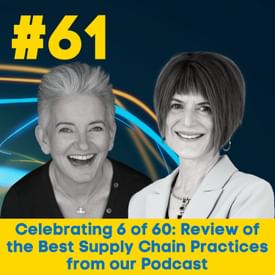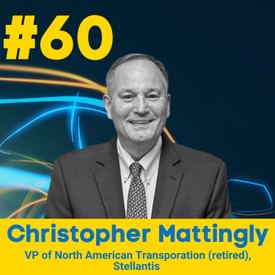In this episode of the Auto Supply Chain Prophets, Andreas Bareid, head of e-mobility for QAD shares his insights on the topic of e-mobility and supply chain management. He highlights the advantages and disadvantages of EV startups, including their ability to move quickly but lack of experience and infrastructure. Traditional automotive companies face similar challenges in adapting to the EV market while dealing with legacy systems. Andreas emphasizes the importance of an integrated approach and scalable solutions for efficient supply chain management.
This episode delves into the concept of speed and the differences between traditional automotive companies and EV startups in terms of implementation expectations. EV startups work on shorter timescales, aiming to move from ideation to engineering, small-scale production, and eventually massive scale in a matter of months. Traditional OEMs tend to follow a more thorough and time-consuming process. The ability to make quick decisions and access data in real time is crucial for growth and competitiveness.
Join this conversation with Andreas Bareid as he also highlights the common pain points in the industry, including the importance of time-to-market for both startups and established companies. And, the interest of foreign companies in establishing onshore operations in the US, as well as the potential consequences of US policies on battery production in Europe and other regions.
Themes discussed in this episode:
- E-mobility and its impact on the supply chain management
- The challenges faced by EV startups in terms of supply chain control, compliance requirements, and onboarding suppliers.
- The importance of having a good supply chain management system and ERP system
- The significance of integrated solutions, government policies, and collaborative efforts within the automotive industry
Featured on this episode:
Name: Andreas Bareid
Title: Director of E-Mobility and Battery Business Development at QAD
About: Andreas leads transformative growth and sustainable innovation in the automotive industry. With QAD Adaptive Applications, he empowers companies to navigate disruption, scale sustainably, and thrive amidst technological advancements.
Connect: Linkedin
Episode Highlights:
[02:28] EV startups and infrastructure. The importance of a good supply chain management system and ERP system for the success of EV startups.
[04:12] Funding requirements for startups. The need for EV startups to move quickly in order to secure funding and avoid going out of business. Different funding requirements at different stages of the startup journey, such as ISO 9001 documentation and compliance with industry standards.
[09:03] US-made car battery supply chain. The impact of US regulations on the battery supply chain, specifically the requirement for 40% of battery components to be produced in the US to qualify for EV subsidy tax credits. The challenges and opportunities for foreign battery companies to establish their supply chain in the US.
[11:14] Tax credits and profit. The profitability of building batteries in the US due to tax credits and incentives for production.
[16:55] Supply chain success. The importance of establishing robust and stable supply chains amidst disruptions caused by the influx of companies in the battery industry; and the significance of speed in scaling up production and meeting future goals related to EV adoption.
Top Quotes:
[03:02] Andreas: "But you want to do as much as possible within the solutions that you're having giving a good foundation for growth and rapid speed to benefit. That is actually the main reason for why many of the EV companies, both tier ones, and OEMs are coming to QAD, because you're sitting on a lot of knowledge and processes and expertise with QAD embedded inside of the system."
[05:15] Andreas: "You take the decision speed, if you're not having the data available at the right time, the ability to take the sessions at a time you actually need it, that is going to hinder you for your further growth."
[14:19] Andreas: "There's a lot of disruption in the market. There's a lot of uncertain supply chains. You need to establish them. You need to be able to onboard them. You need to ensure robustness and your supply chain and the stability and capacity of them in order to look for your goals for 2030 and 2035."
[17:04] Andreas: "Get rid of excel, get rid of excel, and get rid of JIRA to manage your supply chain and to manage your quality. They are tools that are not able to scale, they will break. No matter if you're established or if you're a new entrants that will hinder your growth. You need to lean on the knowledge that are within the supply chain solutions for how you enable your suppliers and communicate with them and execute on the supply chain."
[Transcript]
Jan Griffiths:Hello, and welcome to another episode of Auto Supply Chain Prophets. And with us today is Andreas Bareid. And Andreas is head of e-mobility for QAD. Andreas, welcome to the show!
Andreas Bareid:Thank you very much for having me here. And I'm super excited as well. This is an important topic to me and close to my heart, and I'm looking forward to share my perspectives.
Jan Griffiths:Lovely. Andreas, tell us about e-mobility. How did you get into the e-mobility space?
Andreas Bareid:I've always had a passion for e-mobility and I had hopes that it would kick off sooner than it did. It actually started within QAD a couple of years back when one of the new emerging OEMs reached out to us. And they needed a solution that would be growing with them and providing a lot of their supply chain capabilities in one solution. With that, started off a whole lot of other things within QAD.
Jan Griffiths:That's great. Now, QAD is well known in traditional automotive space both at the OEM level and the tiers. When we talk about EV startups, I'm not talking about an EV business unit within a traditional OEM. A pure EV startup, right. It's been said that one of the advantages of being an EV startup is that they don't have all the infrastructure and the legacy systems that were often bogged down with in traditional automotive. But the other side to that is they don't have the experience and the infrastructure that we have in automotive and it's not all bad, such as a good supply chain management system, a good ERP system is important to the success of any manufacturing operation. So, tell us a little bit about the pure EV startups. How does that work? I mean, you've got to practically take them right back to basics, I would think, right?
Andreas Bareid:Pretty much yes, it's actually very interesting. It's a two-edged sword. One thing is that the EV companies need to go quick. Time is of the essence. So, if they're unable to move quickly, they will lose out on their funding round, and they will go out of business, they want therefore to maybe make things differently in their go to market model in order to be able to go more rapidly. But at the same time, you can't hit the markets with something that you can't provide at scale. And that is all about automotive. So what we see is that the old mirror have a lot of spaghetti diagrams for all of the IT infrastructure that has been bogging the big companies down both on the EV OEM side, as well as the tier ones and tier twos. That is all history. What they're now looking for is an integrated approach for how they can be able to scale, there will still be integrations made, yes, there will still be some certain applications that you need to integrate with the ERP and your supply chain applications. But you want to do as much as possible within the solutions that you're having given a good foundation for growth and rapid speed to benefit. So, with that is actually the main reason for why many of the EV companies, both tier ones, and OEMs are coming to QAD, because you're sitting on a lot of knowledge and processes and expertise with QAD embedded inside of the system.
Jan Griffiths:When you talk about speed, give us a sense of what you really mean. So traditional to one, traditional OEM type of you know, expectation of implementation versus an EV startup. You say that the EV startups want to work at speed but give us a sense of what that really means. We talking weeks instead of months, what are we talking about?
Andreas Bareid:I think we're talking about months rather than years. And with months rather than years is that let's say a startup company is coming up about they're having a great idea. They want to take this from engineering into our ideation and to engineering and then, intern engineering into small scale production from small scale production to massive scale. There's a different part of this journey that you can almost break up into different parts of the funding. And the funding requirements for each of them could be something like you need to be able to document your processes and attain ISO 9001. Or you need to be able if you're going to be supplying to any of the big US OEMs as well as German and you need to be able to have MMOG/LE or IATF compliance and that means also the whole downstream. In order for being able to do that you need to be able to rapidly understand your supply chain, onboard your supply chain and then execute on the supply chain and move that into production. In the old world of the OEMs coming back again to the speed they already have certain All old technical depth and old ways of working, and God forbid, excels flying around, which it's not uncommon, it's not uncommon that excels are holding them back, but also steering the whole company. And then you take the decision speed, if you're not having the data available at the right time, the ability to take the sessions at a time you actually need it, that is going to hinder you for your further growth. So, when we talk about the startup company, scaling up for these phases, we're talking here about getting from pre-production to production within four or five months, compared to original OEM that is trying to think through everything and recreate all past which most probably was able to get them where they are today. But why not be the thing that will get them into the future?
Jan Griffiths:That's really interesting. What are some of the pain points that you see that are common from traditional tier ones? And EV startups? You know, we're talking about the differences. But let's talk about the common pain points. What are some of the common pain points that you see out there?
Andreas Bareid:The common pain points is time to market is important, not only for startups, but also for the established, because in this world where the startups are able to rapidly scale and grow their manufacturing, and scale that up, the ones that are now trying to pivot into EV if they are not able to do the catch up game, they will be the big fish that are being left behind. So also, they are having a speed to benefit requirements. And if they are not able to catch up the whole world of the OEMs that we know of today will be different in two years’ time.
Jan Griffiths:And as much as your experience is extremely beneficial for the EV startups. The other side of that is true to your EV startup experience is beneficial to the more traditional companies, because you're able to bring some of that thinking back into the traditional auto companies, right?
Andreas Bareid:Absolutely. The way of rapidly changing your processes and adapt to the changing environments, to changing business environment change disruptions in the supply chain. That is what's going to help the established companies being able to re-adapt or react to the changes and maybe take the lead and make that change to their competitive advantage. It is actually very interesting to see many of the startup companies that started up three, four years ago. It was, I wouldn't say, so much easier, you had access to capital, a lot more than you have today in this market. But you had a lot less requirements for control over your supply chain than you have today. their supply chain and control elements, some of them positive in terms of you should have control over your supply chain downstream ESD certification, and managing your suppliers' suppliers and ensuring that they are not using forced labor and so on, UFLPA. All of that is positive things for the industry. But a startup that is only focused on producing, say a battery or producing a car. And going through all of that cycle and growing the company and scaling up for the production. Now all of a sudden, they need to be able to know what their suppliers are doing. They have to beg their suppliers to deliver parts to them. And now they need to say, supplier if you want to be given me parts, you need to be able to prove to me that no forced labor was used in your whole supply chain. That's a big, big challenge. As well as with denied party screening, and especially the new lists of foreign entities of concern. It's becoming more of a challenge to be able to do these scale ups and startups today than it was previously. And for that you need to be able to put in the right solutions and systems in place on an earlier stage. In order to be able to support that growth. Excel doesn't cut it you cannot talk to the customs department with excels you need to be able to provide certain solutions that are able to fit those requirements. And I think the biggest challenge we're seeing right now is the positive side of the IRA is a massive interest in selling US made cars and from us assembled here, but also the whole battery supply chain. The battery supply chain is linked into two different parts just to make it easier. You have the raw materials, and you have the battery components the cells the battery packs, the battery components today has to be 40% percent produced in the US in order for the end-customer, buys the car to be able to get $3,750 as EV subsidy tax credit. But in order to have 40% of the battery components made in the US, you already need to have quite a supply chain here. It's going to be two things happening, US made battery components are going to increase in price, because the demand is higher than the supply. And the second one is that there's going to be a lot of battery companies that are coming into the US, right now. And it's all about speed. We're having an interest from Korea, from Japan, from India, from Europe, to establish their whole battery supply chain in the US because Never before has it been more profitable to build batteries than now in the US. So, it's a huge game changer. But that means anyone that is able to build up their capacity for producing these batteries, because that's the first time you actually get the tax credits when you produce them. For the production, you also have for investment for the manufacturing of also research and development. If you're focusing on the production, this is the first time you actually get 30% of your production as a credit. And if you think of this, the first three, four years, you're going to have a lot of scrap. And you're going to get the custom to quality compliance requirements, especially in automotive, so most of your production is not going to end up on the market. So now with these tax credits, it's going to become profitable almost from day one, which is huge for the industry.
Terry Onica:So, Andreas, what are other countries doing?
Andreas Bareid:So, there's two things I would like to maybe highlight. One of them is the interest of onshoring in the US by foreign companies having a different hat on. I'm also the co-chair and sitting as board of directors on that but co-chair for the onshoring committee for better technology, together with friendliness. And we are supporting otter foreign battery industry associations to support members meet and make business arrangements supplier company, low customer joint ventures, we are enabling this bridge between those two countries or regions. And we have been very successful in doing so within a short time we have an MOU with the Korean battery industry association. We have had a delegation to Korea and the other way to the US and we are waiting for other countries to come as well. So that's number one, we're enabling the bridge. But the second one is IRA was not intended to cut off foreign battery industry developments and associations and production and so on. It was about developing and bringing back battery technology know-how and competency so manufacturing back to the US. But it was not intended to overrun the European Korean or Japanese battery production. So, there's a positive and negative consequence we're gonna see is some agreements happening between Free Trade Agreement partners of the US. And now you as a supplier or an OEM need to be able to understand which you are having free trade agreements with and what kind of consequences that has a new supply chain. But the second part of it is that you will have regions like Europe wanting to have a similar kind of policy similar to the IRA. And this will enable the European better production to at least stay at the same pace as the US IRA legislation has provided to the US industry. Nevertheless, speed is again becoming the important factor here because one 200-300 companies are now moving into the US to establish themselves there, at the same time as the startups. That's the same time since the OEM is trying to do their thing for the battery industry. There's a lot of disruption in the market. There's a lot of uncertain supply chains. You need to establish them. You need to be able to onboard them. You need to ensure robustness and your supply chain and the stability and capacity of them in order to look for your goals for 2030 and 2035. When non-EV cars are being bombed for sale in California and Europe and many other places.
Terry Onica:You mentioned NAATBatt. Can you explain what that is to people that may not be familiar with it and your role in it?
Andreas Bareid:So, NAATBatt, it's an organization that was started off back in 2008. Under influence from Barack Obama and founded by Jim Greenberger. And it's an organization that started off with intention of supporting and enabling the growth of the battery technology in the US, and their production efforts, the development of it, the workforce to know how. And it started off with a smaller group of companies that were still active in the US. The latter years have seen a massive increase of membership growth. And we are now at a point with almost 350 members. And this is a very collaborative space, where not only the battery companies, the battery supply chain companies and the OEMs and anyone that is interested in the development of veterans, we are meeting and collaborating. They have several different subcommittees, one for policy, one for biotechnology, onshoring, which I am in the manufacturing, other parts of the supply chain sustainability. And all of these are working on the benefits of how we can move the better technology forward. And my role in it, we started having discussions with the Korean battery industry association back in September of last year. And at that time, we saw an increased interest and building a bridge between those two countries, because the Korean battery industry has a lot of know how they know how to build at scale. And they have covered everything from machine making, to the processing to the cell to the battery packs, production and so on.
Jan Griffiths:What is the most important action that EV, OEMs, and suppliers can take now to ensure future supply chain success?
Andreas Bareid:If there's one thing that I would advise, that is maybe the most simplistic, and easiest thing that should do is to its most basic one as well. Get rid of excel, get rid of excel, and get rid of JIRA to manage your supply chain and to manage your quality. They are tools that are not able to scale, they will break. No matter if you're established or if you're a new entrant that will hinder your growth. You need to lean on the knowledge that are within the supply chain solutions for how you enable your suppliers and communicate with them and execute on the supply chain. How do you manage audit and supplier quality? And how do you manage all of the other aspects for the supply chain and the distribution of that? I've seen a lot of things fail, especially when they're scaling up for traditional as well as for startup. So, if there's one thing I would advise heavily as a use the tools that are available that are made for automotive and scales for automotive.
Jan Griffiths:There it is death to excel spreadsheets and JIRA. Woof. Andreas, thank you very much for joining us today.
Andreas Bareid:Thank you very much for having me here. I appreciate it.




